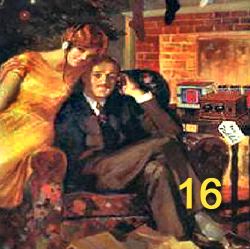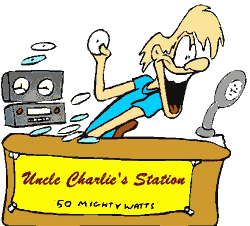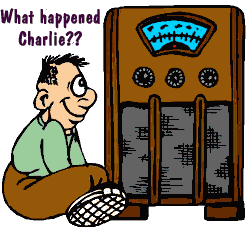|
Film, Radio and TV - 16 |

The Early History
Once radio broadcasting was launched, people began to realize just how significant this new medium could be. For starters, KDKA, along with at least one other radio station, broadcast the 1920 Harding-Cox presidential election returns--in advance of the newspapers. People quickly took note of all the free music, information, and commentary that was suddenly available to anyone with a radio set. But, something else was going on at the same time. Scores of people were building their own personal radio stations, probably motivated in part by the ability to be widely heard by friends, neighbors, relatives, and even strangers. That created a major problem. Soon there were too many
stations for the number of frequencies When uncle Charlie found out about this, he might decide to solve the problem by shifting to a new frequency--which, unfortunately, drowned out someone who had been using that frequency (not to mention make everyone wonder where Charlie had gone). Some thought the solution was simply to use more power to drown out the competition. So it got to be a power battle too. A few stations jacked up the power to the point that they were using ten times today's legal limit.
|
|
The Dawn of Broadcast Advertising Then another element entered the picture--broadcast advertising. In 1922, a station in New York, WEAF, ran a 10-minute talk on the merits of some co-op apartments in Jackson Heights, N.Y--and charged $50 for their effort. That was deemed a toll broadcast--now better known as a commercial. At that point it was discovered that you could actually make money promoting products on radio--and, of course, things haven't been the same since. Other countries had their own ideas about this new medium. Rather than let it be financed by commercials--maybe they could see ahead to what would happen if they did that--they decided it would be best to let the government pay for things. In Great Britain this led to the establishment of the BBC (British Broadcasting Corporation) in 1923. The BBC used public taxes on radio receivers, rather than commercials, to pay for their broadcast system. Later, the CBC (Canadian Broadcast System) was developed in Canada, patterned after the BBC. The problem in Canada was that a large percent of the population spoke French, which meant that programming systems in both English and French had to be developed. Although most counties of that era also adopted government sponsored radio broadcasting, the BBC and CBC are among the few that were able to insulate programming content from direct government influence. In other words, most countries used radio to further the political aims of those in power. Today, a great many still do. There was also concern in the United States about government control if taxes were used to support broadcasting. But there was also the issue of the money that could be made through advertising. At the time the government was quite sympathetic toward big business. This primarily included corporations like AT&T and Westinghouse, which had began to see the profit potential in this new medium. The omnipresent, intrusive nature of broadcast commercials has been a part of U.S. broadcasting ever since. But, at the same time, money that commercials generated stimulated the vigorous growth of both broadcasting and advertising during this era. Plus, given the choice between commercials and the risk of government
control over broadcast content--not to mention the need to dip into tax revenues
to pay for it all--most people agree that commercials are the lesser of the evils.
Government Regulation With the advent of paid radio advertising in the United States, sponsors were rather insistent on having their commercials heard. But, with all the chaos in the airwaves at that time--remember uncle Charlie's problem?--that wasn't working out too well. Stations and advertisers demanded that something be done. Since corporate money and profit were involved (which largely finance politicians), the government suddenly started to get quite interested in doing something about the problem. So the U.S. Congress passed the Radio Act of 1927, which created the Federal Radio Commission (FRC). Its purpose was to organize the licensing of transmitters, including assigning radio station frequencies, call letters, and power limits. In assigning call letters, the FRC saw that radio stations to the east of the Mississippi River started with "W," as in WNBC, WLS, etc., and stations West of the Mississippi start with the letter "K." Since a few stations were licensed before this plan was put in to effect, there are a few exceptions to the "W" and "K" rule. In 1934, the FRC was reorganized into the agency that now controls
U.S. broadcasting, the Federal Communications Commission
(FCC). The FCC's regulatory powers expanded to include
telephone and telegraph--and some years later, television. Noncommercial Radio One of the things the Federal Radio Commission did was reserve some frequencies for noncommercial radio--primarily stations representing educational and religious groups. Unfortunately, due to the pro big-business bias of the government at the time, the channels (frequencies) they were assigned were the least desirable. Not only that, but they were limited in power--typically only 100 watts. (Commercial stations were licensed for power up to 50,000 watts.) Many years later when FM (frequency modulated) radio came along, noncommercial stations were assigned to the low end of the RF (radio frequency) FM spectrum--an area with 20 different channels. In the next module we'll see what some of this so-called "technical stuff" means. |
To next module
To index
© 1996 - 2005, All Rights
Reserved.
|
 available
to separate them on the radio dial. You might be listening to "uncle Charlie's
station," and all of a sudden someone else would turn on their transmitter and drown
him out.
available
to separate them on the radio dial. You might be listening to "uncle Charlie's
station," and all of a sudden someone else would turn on their transmitter and drown
him out.